|
|
|
Sort Order |
|
|
|
Items / Page
|
|
|
|
|
|
|
| Srl | Item |
| 1 |
ID:
125398
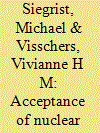

|
|
|
|
|
| Publication |
2013.
|
| Summary/Abstract |
Utilizing a longitudinal study design, the impact of the 2011 accident in Fukushima on acceptance of nuclear power and the evaluation of several scenarios with different percentages of nuclear power were examined. Mail surveys were conducted in the German-speaking part of Switzerland. The first survey took place before the accident in Fukushima (Autumn 2010), the second survey immediately after the accident (March 2011), and the third survey half a year after the accident (October 2011). A sample of 463 persons participated in all three surveys. The accident had a negative impact on the acceptance of nuclear power. The mean change was moderate, and high correlations between the measurement points were observed. Overall, participants thus showed rather stable attitudes towards nuclear power across the three measurement waves. Results of the present study demonstrate the importance of prior beliefs and attitudes for the interpretation of an accident. The evaluation of the various scenarios was strongly influenced by participants' pre-Fukushima attitudes towards nuclear power.
|
|
|
|
|
|
|
|
|
|
|
|
|
|
|
|
| 2 |
ID:
124590
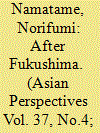

|
|
|
| 3 |
ID:
154851


|
|
|
|
|
| Summary/Abstract |
Since the 3/11 compounded disasters, Japanese energy policy, especially its nuclear policy, has been paralyzed. After the Fukushima disasters, public opinion turned against nuclear energy while the central government continued to push for restarts of the many offline reactors. Based on nearly thirty interviews with relevant actors and primary and secondary materials, we use qualitative comparative analysis (QCA) and five case studies to illuminate the impact of conditions influencing reactor restarts in Japan after 3/11. We investigate which local actors hold the greatest power to veto nuclear power policy, and why and when they choose to use it. Key decisions in nuclear power policy involve approval from multiple institutions with varying legal jurisdiction, making vetoes the result of multiple actors and conditions. Certain legal and political factors, such as court, regulator, and gubernatorial opposition (or support), matter more than technical factors (such as the age of the reactor or its size) and other political factors (such as town council or prefectural assembly opposition or support). Local politics can stymie a national government’s nuclear policy goals through combinations of specific physical conditions and vetoes from relevant actors, rather than through the actions of local opposition or single “heroic” governors. Our findings challenge the assumption that utilities unilaterally accept a governor’s vetoes, but reinforce the notion that specific judicial and electoral veto players are blocking an otherwise expected return to a pro-nuclear status quo.
|
|
|
|
|
|
|
|
|
|
|
|
|
|
|
|
| 4 |
ID:
127934
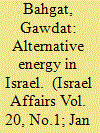

|
|
|
|
|
| Publication |
2014.
|
| Summary/Abstract |
Unlike other countries in the Middle East, Israel has limited hydrocarbon deposits. Since its founding in 1948 Israel has largely relied on foreign supplies to meet almost all its energy needs. In recent years substantial natural gas deposits have been discovered in the Eastern Mediterranean. These discoveries are likely to fundamentally improve the country's energy security. Equally important, Israel has invested massive efforts and resources to utilize the largely untapped solar and wind power. It has also considered initiating a nuclear power programme. Finally, efforts have been made to raise energy efficiency.
|
|
|
|
|
|
|
|
|
|
|
|
|
|
|
|
| 5 |
ID:
094537
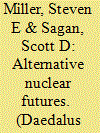

|
|
|
| 6 |
ID:
150378
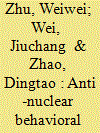

|
|
|
|
|
| Summary/Abstract |
This study explored the key factors underlying people's anti-nuclear behavioral intentions. The protective action decision model and the heuristic–systematic model were integrated and adapted from a risk information perspective to construct a hypothetical model. A questionnaire study was conducted on a sample of residents near the Haiyang Nuclear Power Plant, which is under construction in Shandong Province, China (N=487). Results show that, as expected, perceived knowledge is vital in predicting people's information insufficiency, information seeking, systematic processing, and risk perception. Moreover, the inverted U relationship between perceived knowledge and anti-nuclear behavioral intentions is indicated in the study. Information insufficiency and information seeking also significantly predict systematic processing. Furthermore, people's behavioral intentions are motivated by risk perception but fail to be stimulated by systematic processing. Implications and recommendations for future research are discussed.
|
|
|
|
|
|
|
|
|
|
|
|
|
|
|
|
| 7 |
ID:
026345


|
|
|
|
|
| Publication |
New Delhi, Vikas Publishing House, 1977.
|
| Description |
xii,142p.hbk
|
| Standard Number |
0706905024
|
|
|
|
|
|
|
|
|
|
|
|
Copies: C:1/I:0,R:0,Q:0
Circulation
| Accession# | Call# | Current Location | Status | Policy | Location |
| 018428 | 953/ELR 018428 | Main | On Shelf | General | |
|
|
|
|
| 8 |
ID:
044144
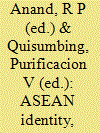

|
|
|
|
|
| Publication |
Quezon city (Phillpines)University of the Philippines Law center, UP Law Center and East-West Center Culture Learning Institute, 1981.
|
| Description |
xxx, 411p.hbk
|
|
|
|
|
|
|
|
|
|
|
|
Copies: C:1/I:0,R:0,Q:0
Circulation
| Accession# | Call# | Current Location | Status | Policy | Location |
| 022222 | 959/ANA 022222 | Main | On Shelf | General | |
|
|
|
|
| 9 |
ID:
140494
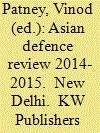

|
|
|
|
|
| Publication |
New Delhi, KW Publishers Pvt Ltd, 2015.
|
| Description |
vii, 240p.hbk
|
| Standard Number |
9789383649648
|
|
|
|
|
|
|
|
|
|
|
|
Copies: C:1/I:0,R:0,Q:0
Circulation
| Accession# | Call# | Current Location | Status | Policy | Location |
| 058273 | 355.03305/PAT 058273 | Main | On Shelf | General | |
|
|
|
|
| 10 |
ID:
111351
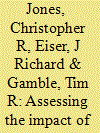

|
|
|
|
|
| Publication |
2012.
|
| Summary/Abstract |
In 2007 the UK government's public consultation on the future of nuclear power courted much criticism. Three studies were conducted to assess whether key arguments used by government within this consultation might have influenced public opinion about the technology. Participants first read a passage of text that made salient certain positive (climate change mitigation, increased energy security) or negative (nuclear waste) aspects of the nuclear debate. Participants then completed a task that required them to create an electricity mix for the UK by varying the contributions made by each of five energy sources (coal, gas, nuclear, renewables and electric import). Study 1 seemed to indicate that pitching the debate in terms of climate change mitigation was effective in increasing endorsement of nuclear power. The results of studies 2 and 3, however, contested this conclusion, suggesting that these arguments were having little direct impact upon participants' preferences for nuclear power. The results of these studies hold implications for UK energy policy and attitude assessment and can contribute to the understanding of how the arguments used by government in the 2007 consultation might have influenced public opinion.
|
|
|
|
|
|
|
|
|
|
|
|
|
|
|
|
| 11 |
ID:
141883
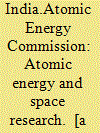

|
|
|
|
|
| Publication |
New Delhi, Govt. Publications, 1970.
|
| Description |
vi, 41p.pbk
|
| Contents |
B
|
|
|
|
|
|
|
|
|
|
|
|
Copies: C:1/I:0,R:0,Q:0
Circulation
| Accession# | Call# | Current Location | Status | Policy | Location |
| 058377 | 333.7924094/IND 058377 | Main | On Shelf | General | |
|
|
|
|
| 12 |
ID:
152070
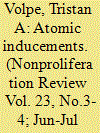

|
|
|
|
|
| Summary/Abstract |
This article argues for an updated strategy to limit the spread of sensitive nuclear technology around the globe. Traditional efforts by the United States to deny countries access to enrichment and reprocessing (ENR) technology are becoming difficult to enforce, while the threat of sanctions against US allies with legal nuclear-energy programs is not credible. As a result, the United States should shift toward a strategy of “buying out” an ally’s ambition for sensitive nuclear technology. Offering military, political, and economic assistance in exchange for stringent nonproliferation commitments will only work when offered at the earliest stage of technical development, before the country builds capabilities that will be difficult or expensive to give up. While there are some practical challenges to implementing such a strategy, the conditions are right to see if lucrative nuclear-energy offers—notably spent-waste management solutions—can induce countries with new civil nuclear programs to foreclose the option to develop ENR technology in the future.
|
|
|
|
|
|
|
|
|
|
|
|
|
|
|
|
| 13 |
ID:
158300
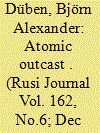

|
|
|
|
|
| Summary/Abstract |
The recent developments in North Korea’s nuclear weapons programme have thrown the issue of nuclear proliferation and deterrence in East Asia into sharp relief, but to date the discussion of what long-term impact these developments are likely to have on the international system has not progressed very far. Björn Alexander Düben asks how Pyongyang is likely to behave now that it has passed a major threshold in nuclear weapons development, and what the implications for global security are.
|
|
|
|
|
|
|
|
|
|
|
|
|
|
|
|
| 14 |
ID:
125827


|
|
|
|
|
| Publication |
2013.
|
| Summary/Abstract |
A survey was conducted to study the attitudes of Hong Kong residents toward the safety of operations of the nuclear power plant in Daya Bay and their possible actions in case of leakage. Only 34.5% of the respondents were confident about the operational safety of the nuclear power plant, whereas 23% stated they would immediately leave Hong Kong when leakage occurs. Chi-square tests and multinomial logit analysis indicate that the degree of confidence is significantly related to the perceived ability of the Hong Kong (HK) government and the nuclear power plant company, China Light and Power Co. Ltd. (CLP), knowledge of emergency plan and responsibility, gender, and age. However, the degree of confidence is not significantly related to the distance of the residential area from the nuclear power plant. In addition, the higher the perceived ability of the HK Government and CLP to handle nuclear leakage, the greater the degree of confidence becomes. The chi-square tests suggest that higher perceived ability of the HK Government and CLP are also significantly associated with less likelihood of residents immediately leaving Hong Kong in case of leakage. Hence, the HK Government and CLP are recommended to improve their perceived ability for safety and social stability.
|
|
|
|
|
|
|
|
|
|
|
|
|
|
|
|
| 15 |
ID:
110355
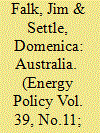

|
|
|
|
|
| Publication |
2011.
|
| Summary/Abstract |
This paper considers energy policy in Australia in the context of its considerable energy resources, climate change and a recent change in government. It examines the possible paths that future energy use and policy in Australia could take, including published projections based largely on a "business as usual" approach and projections based on a dramatic shift towards more efficient use of energy and renewable energy technologies. It also considers the various factors affecting future policy direction, including energy security, the advocacy in Australia for establishing nuclear electricity generation and other parts of the nuclear fuel-cycle, responses to climate change, and carbon sequestration. It concludes that while the Australian Government is currently reluctant to move away from a dependence on coal, and unlikely to adopt nuclear energy generation, a low-emissions future without waiting for the deployment of carbon capture and storage and without resorting to nuclear power is within reach. However, in the face of strong pressure from interest groups associated with energy intensive industry, making the necessary innovations will require further growth of community concern about climate change, and the development of greater understanding of the feasibility of employing low carbon-emissions options.
|
|
|
|
|
|
|
|
|
|
|
|
|
|
|
|
| 16 |
ID:
023557
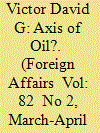

|
|
|
|
|
| Publication |
March-April 2003.
|
| Description |
47-61
|
|
|
|
|
|
|
|
|
|
|
|
|
|
|
|
| 17 |
ID:
005609


|
|
|
|
|
| Publication |
New York, Random House, 1995.
|
| Description |
x, 350p.Hbk
|
| Standard Number |
0679436170
|
|
|
|
|
|
|
|
|
|
|
|
Copies: C:1/I:0,R:0,Q:0
Circulation
| Accession# | Call# | Current Location | Status | Policy | Location |
| 036521 | 923.25694/PER 036521 | Main | On Shelf | General | |
|
|
|
|
| 18 |
ID:
124144
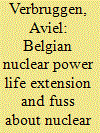

|
|
|
|
|
| Publication |
2013.
|
| Summary/Abstract |
Nuclear decision-making is embedded in slowly evolving political, economic and financial institutions. Belgium houses extended nuclear activities, mostly under French control, for example: SUEZ-GDF and EDF own all Belgian nuclear power plants. But a 2003 law mandates the closure of Belgium's nuclear power plants at a service age of 40 years; only force majeure could lift the strict obligation. Opposition to the law argued with climate change danger, financial losses, and loss-of-load risks. The financial issue got interwoven with a fuzzy debate on the definition, height and appropriation of “nuclear rents”. As plausible hypothesis is adopted: the prospected transfer of hundreds millions of euro from power companies to the public interest will create public support for life extension. But the nuclear rents discussion had faded in July 2012 when the Belgian government admitted a 10-year life extension for TIHANGE I (962 MW) and imposed the closure of the 2×433 MW DOEL I and II. Loss-of-load risk was the government's only public argument. The opacity of the decision process and its “fifty-fifty” outcome do not allow proper testing of the hypothesis. The case illustrates that politicians cannot bind their followers except through the deployment of alternative power sources.
|
|
|
|
|
|
|
|
|
|
|
|
|
|
|
|
| 19 |
ID:
123669
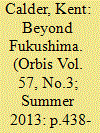

|
|
|
|
|
| Publication |
2013.
|
| Summary/Abstract |
This article considers the political-economic process by which "energy angst" created an embedded nuclear orientation in Japanese energy policymaking, and then how, following Fukushima, Japan initially tried to transform that structural tendency, through a political system poorly suited to reform, before edging back toward its traditional path. Due both to the prevailing systemic bias and the underlying political economy of nuclear power, the process of transformation promises to be a turbulent and extended one, with natural gas and energy efficiency being crucial tools for ameliorating the difficult realities of the domestic status quo.
|
|
|
|
|
|
|
|
|
|
|
|
|
|
|
|
| 20 |
ID:
094516
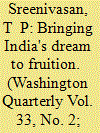

|
|
|
|
|
|
|
|